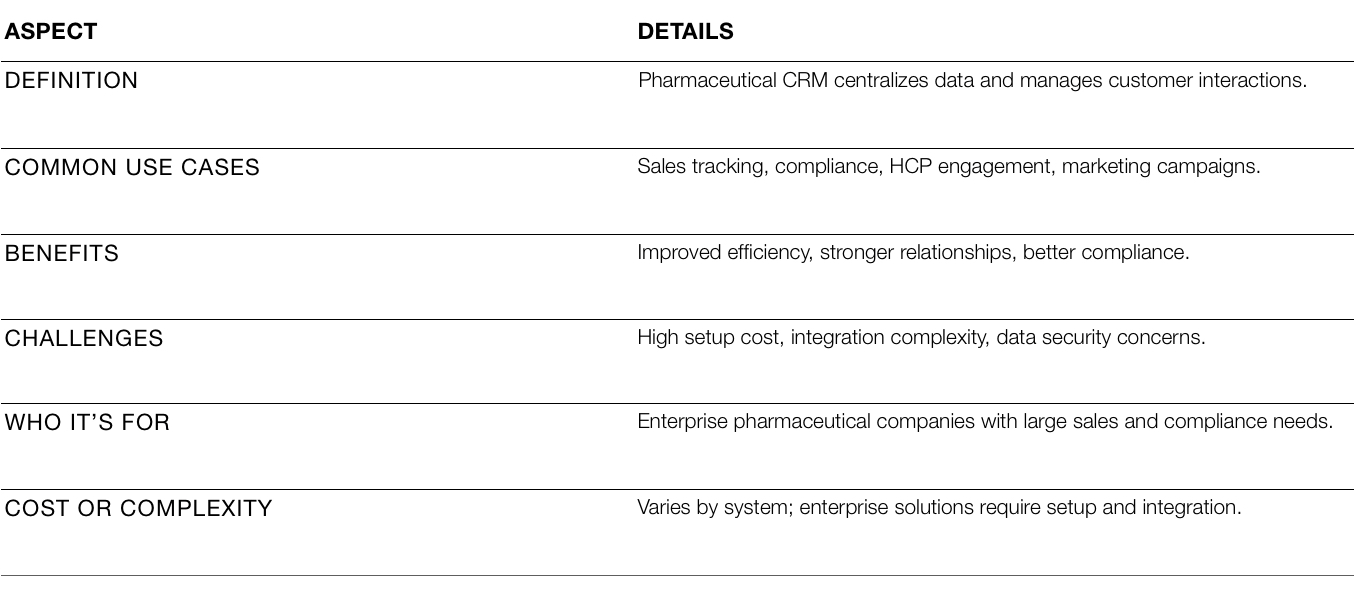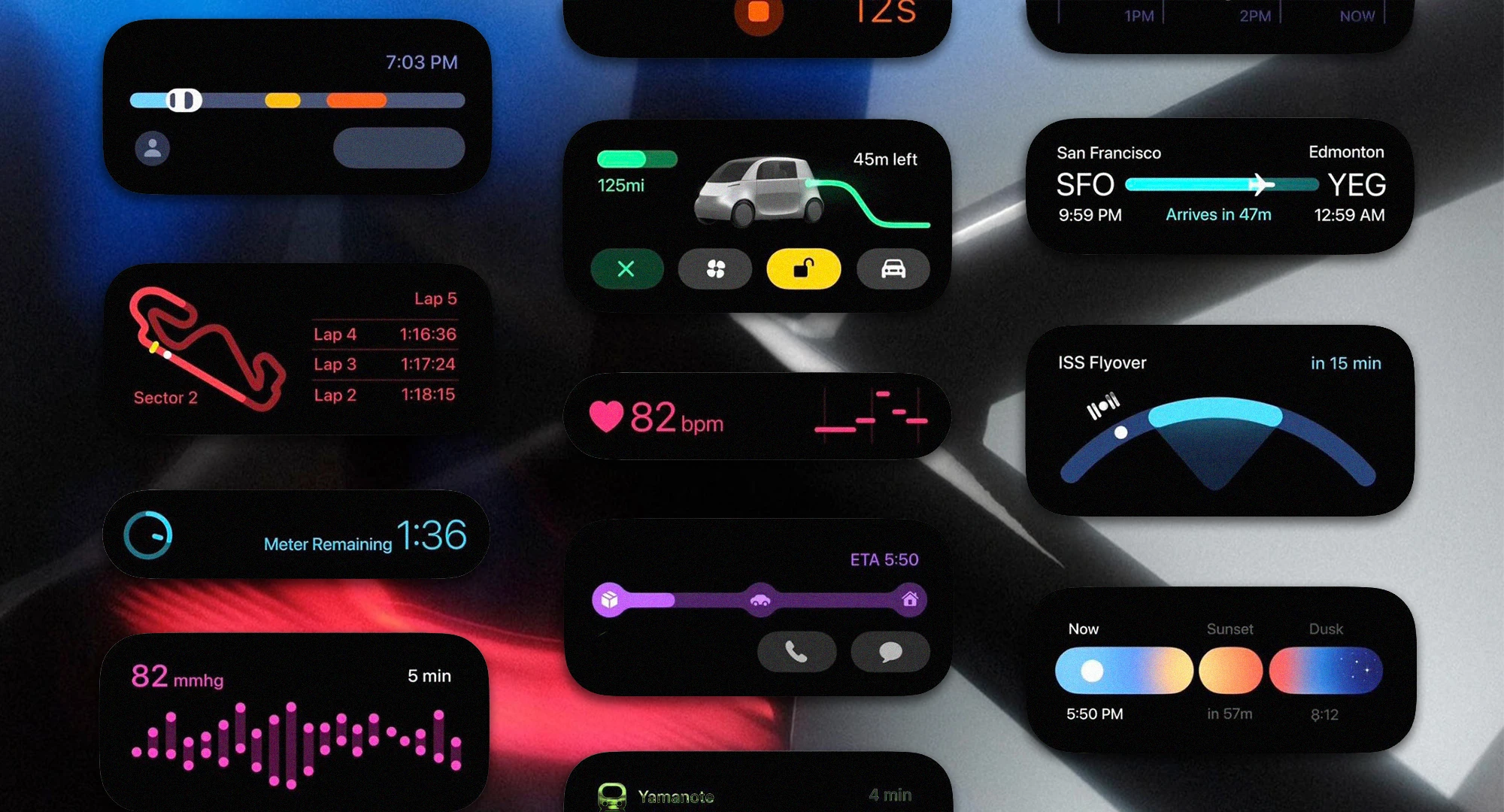
Pharmaceutical CRM FAQs: CRM in Pharmaceutical Industry Explained
Introduction
Pharmaceutical companies manage vast networks of healthcare providers, sales teams, and regulatory requirements. Many leaders face challenges with fragmented data, siloed systems, and inconsistent engagement across regions. These gaps often make it difficult to track customer needs or optimize field operations.
This article explains pharmaceutical CRM and why it matters. Readers will gain clarity on the role of CRM in pharmaceutical industry operations, the benefits of CRM software pharma companies use, and the steps to evaluate pharmaceutical CRM systems.
Market Context: Disruption & Opportunity
The pharmaceutical industry is under pressure from changing regulations, digital transformation, and growing competition. Traditional approaches to customer management often fail to meet the expectations of healthcare providers and patients. Manual processes, disconnected data, and outdated communication tools limit visibility and slow decision-making.
CRM in pharma industry settings has become a driver of efficiency and growth. Pharmaceutical CRM tools now enable companies to unify customer data, improve engagement, and comply with strict standards. Pharma CRM systems create opportunities to deliver more value in sales, marketing, and medical affairs. Companies adopting CRM software for pharmaceutical industry operations are better positioned to build trust, speed innovation, and gain an edge in a competitive market.
FAQs Snapshot

What is CRM in pharma?
CRM in pharma refers to customer relationship management systems designed for pharmaceutical companies. These platforms centralize customer data, track interactions, and support sales and marketing. Pharmaceutical CRM software helps improve communication with healthcare providers and manage compliance needs. Pharma CRM systems give leaders real-time insights to improve efficiency and drive engagement.
Why is pharmaceutical CRM important?
Pharmaceutical CRM is important because it helps large organizations manage complex relationships with doctors, hospitals, distributors, and regulators. CRM for pharmaceutical companies allows leaders to streamline processes, reduce data silos, and deliver consistent communication. By using pharma CRM solutions, brands can track performance, improve sales strategies, and stay competitive.
How does CRM software for pharmaceutical companies work?
CRM software for pharmaceutical companies integrates sales, marketing, and customer service into one platform. It collects data from multiple channels such as emails, meetings, and healthcare portals. This data is then analyzed to provide actionable insights. Pharmaceutical CRM systems help sales reps prioritize accounts, enable marketing to personalize outreach, and ensure compliance with industry standards.
What are the benefits of CRM in pharmaceutical industry operations?
CRM in pharmaceutical industry settings improves efficiency and customer engagement. Pharma CRM tools make it easier to coordinate large sales teams and maintain accurate records. With pharmaceutical CRM systems, companies can enhance collaboration between departments, speed up reporting, and align commercial strategies.
What challenges do pharma CRM systems address?
Pharma CRM systems address challenges like fragmented data, inefficient sales processes, and compliance risks. Many pharmaceutical companies struggle with outdated spreadsheets and manual processes. CRM software pharma platforms reduce errors, automate reporting, and ensure that critical information is always accessible. This reduces compliance issues while improving performance.
Who should use pharmaceutical CRM software?
Pharmaceutical CRM software is ideal for enterprise pharmaceutical companies with complex operations. CRM for pharma companies supports sales teams, marketing leaders, and compliance officers. Executives benefit from real-time dashboards, while field teams gain mobile access to data that improves their work with healthcare providers.
Quick Summary Table

Let’s kickstart the conversation and design stuff people will love.

Deep-Dive Sections

What It Is & Why It Matters
Pharmaceutical CRM is a system designed to manage healthcare provider relationships, sales processes, and regulatory compliance. It matters because data in pharmaceutical companies is often fragmented across multiple systems, making it hard for leaders to make informed decisions. CRM for pharmaceutical industry operations provides a unified platform that supports engagement strategies, compliance, and efficiency.
How It Works
Pharmaceutical CRM systems collect and organize data from sales reps, marketing campaigns, and provider interactions. CRM software pharma companies use allows teams to log activities, track outcomes, and identify trends. Integrated analytics give decision-makers the ability to see which campaigns or sales strategies deliver results. Pharma CRM systems also use automation to reduce manual tasks and increase productivity.
When to Use It (and When Not To)
Pharma CRM solutions are best used when a company manages large sales networks, multiple product lines, or complex compliance requirements. They work well for enterprise teams that need centralized data. However, pharmaceutical CRM tools may not be necessary for small firms with limited customer interactions or simple product lines. Leaders should evaluate whether the investment aligns with their scale.
Tools or Platforms Involved
Pharmaceutical CRM software includes a range of platforms designed for enterprise use. CRM for pharma companies often integrates with ERP systems, marketing automation tools, and compliance management platforms. Pharmaceutical CRM systems may also connect to mobile applications for field reps and dashboards for executives.
Cost Considerations
CRM software for pharmaceutical companies can range from moderate to high cost depending on customization and integration needs. Pharma CRM systems may include licensing fees, setup costs, and ongoing maintenance. Large enterprises often require advanced features such as data security, compliance modules, and analytics, which increase cost.
Integration or Setup Requirements
Pharmaceutical CRM systems require integration with existing IT infrastructure. This may include ERP, HR, and compliance platforms. CRM in pharma industry operations often needs careful planning to ensure data flows smoothly. Successful setups typically involve cross-department collaboration and external consulting partners to handle complexity.
Scalability & Flexibility
Pharma CRM solutions are designed to scale with enterprise operations. As companies expand, CRM software pharma platforms allow leaders to add new users, integrate new products, and extend features. Pharmaceutical CRM systems offer flexibility with modules for marketing, sales, and compliance, adapting to organizational growth.
Alternatives or Comparisons
Pharmaceutical CRM systems are often compared with general CRM platforms. While general CRM tools offer basic sales and marketing functions, they lack features specific to compliance and healthcare provider engagement. Pharmaceutical CRM software includes modules built for the pharma industry, such as sample tracking, regulatory reporting, and territory management. Alternatives include using spreadsheets or fragmented systems, but these create risks with data accuracy and compliance. Compared to standard CRM software, pharma CRM solutions give companies greater industry alignment and operational control.
Trends
Pharma CRM systems are adopting AI-driven analytics, automation, and predictive insights. CRM in pharmaceutical industry platforms now help forecast demand, personalize provider engagement, and detect compliance risks early. These trends make CRM for pharma companies more strategic, positioning them as critical tools for future growth.
Pros and Cons
Pharma CRM systems provide clear benefits, but they also come with trade-offs. On the positive side, pharmaceutical CRM tools improve efficiency, centralize data, and strengthen relationships with healthcare providers. They also reduce compliance risks and provide better insights for executives. However, the cons include high implementation costs, integration challenges, and the need for extensive training. CRM software for pharmaceutical companies also requires ongoing updates to stay aligned with regulatory changes. Leaders should weigh these pros and cons before selecting the right solution.
How G&Co. Can Help

At G&Co., we work with enterprise pharmaceutical companies to define and implement effective CRM strategies. We bring experience helping brands integrate pharmaceutical CRM systems, optimize workflows, and align cross-functional teams. Our consultants understand how to balance compliance, efficiency, and engagement to deliver measurable impact.
We offer strategic consulting, integration support, and optimization for pharmaceutical CRM software and pharma CRM solutions. With our guidance, leaders gain clarity on which platforms deliver results and how to set them up for long-term success. Talk to us to clarify your strategy and move forward with confidence.
Conclusion & Next Steps
This article explained CRM in pharma industry operations, covering what pharmaceutical CRM is, why it matters, and how pharma CRM systems deliver value. We explored benefits, challenges, costs, and trends, giving leaders the clarity they need to evaluate options.
At G&Co., we have worked with enterprise clients to implement CRM for pharmaceutical companies through digital strategy, customer journey redesign, and platform modernization. Our expertise enables brands to turn trend awareness into practical advantage. Still have questions? Reach out and let’s solve them together.






%20(1).png)




